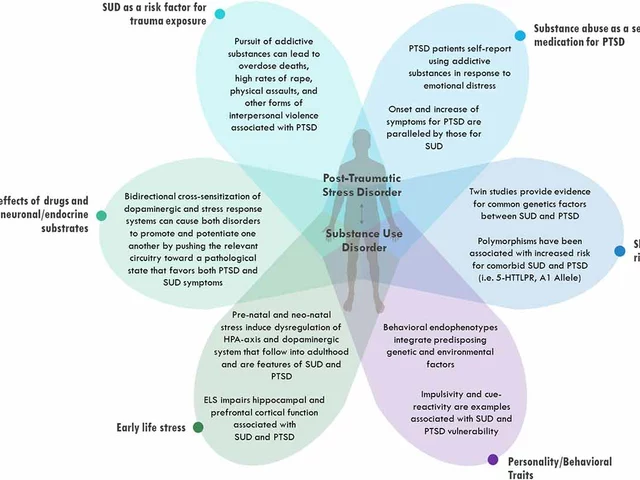Navigating the turbulent seas of alcohol dependence requires more than just sheer willpower. The traditional stalwart, Antabuse, has been a familiar face in this battle for decades. But what if Antabuse isn't the knight in shining armor for everyone? Enter the world of alternative treatments. Each brings its own strengths and complexities to the table, offering hope to those finding Antabuse's approach too aggressive or simply ineffective.
This article isn't just another reiteration of what's known. Instead, it takes a fresh dive into six compelling alternatives, dissecting and examining each to empower you with knowledge. You'll discover both their promising aspects and tricky downsides, helping solidify your path to recovery or openness to recommend these options to others in need. Whether you're a newcomer to alcohol dependence treatments or a seasoned advisor seeking broader horizons, these insights might offer you a clearer view of the ever-evolving landscape.
Naltrexone
Among the roster of medications designed to aid in alcohol dependence, Naltrexone stands out with its unique approach. Originally developed for opioid addiction but later approved for alcohol use disorder, Naltrexone works by blocking the euphoric and sedative effects of alcohol. This action helps reduce cravings, making it an intriguing alternative to Antabuse.
Pros
- Craving Reduction: Naltrexone is particularly effective for individuals who experience intense cravings for alcohol, offering a reduction in the reward feeling associated with drinking.
- Dual Use: Not only does it assist with alcohol dependence, but it is also beneficial for opioid addiction, providing a two-fold advantage for those battling both dependencies.
- Consistency in Results: Clinical studies have shown that Naltrexone can decrease the likelihood of heavy drinking days by 83%.
- Flexible Use: It can be taken as a daily oral tablet or as a monthly injectable (in the form of Vivitrol), accommodating different lifestyle needs and preferences.
Cons
- Side Effects: As with many medications, side effects can occur, ranging from mild (nausea, fatigue) to more severe (liver damage), especially if combined with alcohol.
- Commitment Required: Naltrexone treatment requires a committed partner in readiness because skipping doses can diminish its efficacy.
- Limited Reinforcement: This medication might not be suitable for those who heavily rely on the behavioral reinforcement of staying abstinent, which Antabuse offers by producing negative reactions to alcohol.
Choosing Naltrexone as an Antabuse alternative reflects a move towards mitigating cravings rather than imposing a deterrent. While it lacks the dramatic aversive therapy component of Antabuse, its capacity to manage cravings without affecting everyday life can be quite liberating. However, consistency and adherence remain the linchpins of its success. With its wider scope and relatively gentle approach compared to Antabuse, many individuals find it a compelling choice in their journey towards recovery.
Acamprosate
Acamprosate, a medication better known under the brand name Campral, is a unique player in the world of alcohol dependence treatment. Developed from a branch of amino acid derivatives, it has been a staple in Europe for many years before gaining traction in other parts of the world. Unlike Antabuse, which works by causing unpleasant reactions when alcohol is consumed, Acamprosate aims to stabilize the brain's chemical balance, often disrupted by prolonged alcohol use.
How exactly does it work? When someone stops drinking after regular heavy use, the brain experiences a tumultuous rebalance of neurotransmitters. Acamprosate modulates the function of both excitatory and inhibitory neurotransmitters, mainly targeting the glutamatergic system. This action helps reduce the physical distress and emotional upheavals associated with long-term abstinence.
Pros
- Non-addictive: Unlike some other treatments for alcohol dependence, Acamprosate does not pose a risk of creating dependency.
- Minimal Side Effects: Users typically report fewer and milder side effects compared to other medications like Naltrexone or Topiramate.
- Effective for Maintaining Abstinence: Studies have shown it aids in maintaining long-term sobriety by reducing the cravings and discomfort caused by withdrawal.
Cons
- Delayed Onset: It usually takes about five to eight days to reach full effectiveness, making it less ideal for those seeking immediate relief.
- Strict Adherence Required: Acamprosate requires a consistent dosing schedule, often with three daily doses, which can be challenging for some users to maintain.
- Liver Function Concerns: Though rare, it may cause symptoms in patients with pre-existing liver issues, meaning regular monitoring may be necessary.
A study published in the Journal of Psychopharmacology highlighted that combining Acamprosate with targeted cognitive-behavioral therapy (CBT) can significantly improve outcomes compared to medication alone. This underscores the importance of a holistic treatment approach.
Overall, Acamprosate offers a solid alternative for those who find Antabuse unsuitable, particularly for individuals already committed to cessation and needing support in sustaining that state. As always, any treatment plan involving Acamprosate should be carefully tailored and monitored by health professionals, ensuring it's the right fit considering the patient's medical history and lifestyle.
Topiramate
Topiramate, initially introduced to the pharmaceutical world as a treatment for epilepsy and prevention of migraines, has increasingly found its footing as an alternative in managing alcohol dependence. Though not classically associated with alcohol treatment, its unique mechanism of action makes it a noteworthy consideration for those seeking alternatives to Antabuse.
How Does It Work?
Primarily, Topiramate functions by stabilizing neuronal activity and inhibiting the release of glutamate, an excitatory neurotransmitter. This dual action not only helps in reducing cravings for alcohol but also mitigates the dysphoric effects associated with alcohol withdrawal. According to several studies, individuals treated with Topiramate showed a significant reduction in the number of heavy drinking days compared to placebo.
Pros
- Proven efficacy in reducing alcohol consumption and increasing abstinent days.
- Beneficial for individuals with comorbid conditions like migraines or seizures, potentially reducing polypharmacy.
- Non-addictive nature with no known euphoric effects tied to the drug itself.
Cons
- Common side effects include cognitive dulling, word-finding difficulties, and paresthesia, which can be unsettling for some users.
- The need for gradual dose titration may delay the onset of maximum therapeutic effects.
- Potential interactions with medications metabolized by CYP3A4 enzymes which can complicate poly-drug regimens.
While Topiramate shines in certain areas, it is not without its hurdles. Initiation of treatment requires careful dose adjustment to balance efficacy with tolerability, and patients should be prepared for the cognitive side effects that can accompany its usage. However, for those who can tolerate the side effects, it presents a valuable option, especially when traditional treatments like Antabuse aren’t suitable or effective.
A Right Fit for Whom?
Topiramate offers far more than just an alternative medication; it’s a bridge to recovery for those whose therapeutic journey requires a multi-angle approach. Especially useful for individuals dealing with co-occurring disorders, its versatility in addressing both neurological and dependency challenges makes it an invaluable tool in a comprehensive treatment plan.

Vivitrol
Among the arsenal used in combating alcohol dependence, Vivitrol stands out as a marvel of modern pharmacology. Vivitrol, a brand name for the drug naltrexone, is a monthly injectable treatment that reduces the desire to drink by blocking the euphoric effects of alcohol on the brain. The convenience of a single shot taken once a month makes it a worthwhile consideration for those seeking a less recurrent intervention.
How Vivitrol Works
Unlike daily oral medications, Vivitrol comes in the form of an extended-release injection, typically administered by a healthcare professional. By delivering a steady dose over the course of a month, Vivitrol mitigates the peaks and troughs often associated with daily medication adherence. Its mechanism involves binding to opioid receptors in the brain, preventing alcohol from activating these pathways, thus dampening the pleasurable feelings associated with drinking.
Pros
- Convenience: The monthly injection removes the daily burden of remembering to take a pill, which improves adherence rates dramatically.
- Effectiveness: Clinical studies demonstrate that patients using Vivitrol experienced fewer heavy drinking days over a six-month period compared to those on a placebo.
- Blocking cravings: By blocking the euphoric effects of alcohol, Vivitrol helps decrease the cravings, making it easier for individuals to maintain sobriety.
Cons
- Cost: The price of a monthly injection can be prohibitive for some, potentially limiting its accessibility.
- Pain and Reactions at Injection Site: Some users report pain, swelling, or other reactions at the site of injection which possibly discourages continued usage.
- Requires Abstinence: The medication requires users to abstain from alcohol for at least 7-10 days before initiation, which can be challenging for some individuals.
In considering Vivitrol, it's crucial to weigh its benefits against the potential drawbacks. The option to free oneself from the grips of addiction with fewer daily considerations and continued sobriety assistance makes Vivitrol a popular choice. However, potential users must account for the financial implications and the physical demands of injections before embracing it as a viable solution to alcohol dependence.
Gabapentin
Gabapentin, primarily known for its role in treating neurological conditions such as epilepsy and neuropathic pain, has been found to offer promising results in managing alcohol dependence. Its mechanism of action involves modulating the neurotransmitter systems in the brain, specifically by affecting GABA (gamma-aminobutyric acid) pathways. This can be a game-changer for those who struggle with alcohol withdrawal symptoms or cravings.
While it might not be the first medication that comes to mind when considering Antabuse alternatives, Gabapentin has slowly garnered attention in the medical community for its off-label use. Clinical trials have started to unearth its potential, showing that it can reduce cravings and stabilize mood, thus providing a more holistic approach to treatment.
Pros
- Effective in reducing withdrawal symptoms, making the initial stages of sobriety more manageable.
- Low risk of severe side effects or adverse reactions, especially compared to other medications.
- Offers dual benefits for those with comorbid conditions like anxiety.
Cons
- Still not officially approved for alcohol dependence, meaning its use is largely experimental.
- Potential for dependence or misuse, particularly in individuals with a history of substance abuse.
- Effects can vary, requiring careful monitoring and dosage adjustments.
Perhaps the most compelling aspect of Gabapentin as a medication option is its ability to treat the anxiety often intertwined with alcohol abuse. Rather than focusing solely on the addiction itself, Gabapentin addresses the mental health issues that can often serve as a stumbling block to recovery.
Considering its rich pharmacological profile, Gabapentin's role in treating alcohol dependence is likely to expand as research continues. For those seeking a path less traveled, it may offer a unique blend of efficacy and tolerability.
Baclofen
Baclofen, a medication primarily used to treat spasticity, has emerged as a compelling alternative in the arena of alcohol dependence treatment. Initially developed to address neurological spasms, its potential in reducing cravings and easing withdrawal symptoms associated with alcohol use has brought it to the forefront of addiction therapy options.
Derived from the neurotransmitter gamma-aminobutyric acid (GABA), Baclofen functions by mimicking GABA's effects in the brain, promoting relaxation, and reducing excitement in the nervous system. This makes it particularly promising for individuals who find traditional Antabuse alternatives too harsh or incompatible with their physiological needs.
Pros
- Evidence indicates that Baclofen can significantly reduce alcohol cravings, providing a sense of relief for those struggling with dependency.
- It is considered safe for those with liver damage, a common concern among individuals with a history of heavy drinking.
- There's potential for Baclofen to assist in managing anxiety and promoting a sense of calmness, which can be beneficial during the recovery process.
- Unlike some other treatments, Baclofen doesn’t carry the risk of severe reactions if alcohol is consumed, offering a safer profile for patients still battling with complete abstinence.
Cons
- Common side effects include drowsiness, dizziness, and gastric disturbances, which can impact daily functionality.
- There's a risk of dependency on Baclofen itself if not carefully monitored and managed.
- Not all studies agree on its efficacy, suggesting that results may vary significantly from one individual to another.
- High doses required for effective alcohol craving reduction might increase the intensity of side effects.
While Baclofen doesn’t aim to replace other approved medications like Naltrexone or Acamprosate, it provides a versatile, often less intimidating option, particularly in complex cases where patients show resistance to other treatments. It's an intriguing newcomer in the landscape of medication options for alcohol dependence, worthy of consideration for those exploring personalized treatment plans.

Comparison Table
When tackling alcohol dependence treatment, knowing your options can be a game-changer. We understand that each individual's journey is unique, and while Antabuse alternatives might not be a one-size-fits-all solution, understanding their nuances can lead to a more informed choice.
Here's a handy comparison to help navigate these options.
| Alternative | Mechanism | Pros | Cons |
|---|---|---|---|
| Naltrexone | Reduces cravings and pleasurable effects of alcohol. |
|
|
| Acamprosate | Stabilizes brain activity post-alcohol withdrawal. |
|
|
| Topiramate | Encourages reduced drinking through neural inhibition. |
|
|
| Vivitrol | Long-acting injectable form of naltrexone. |
|
|
| Gabapentin | Modifies neurotransmitter release to reduce anxiety and cravings. |
|
|
| Baclofen | Regulates gamma-aminobutyric acid (GABA) levels to curb urge. |
|
|
This comparison is more than just a juxtaposition of options. Each medication's interaction with your body can feel as different as a sun-drenched early morning and a twilight evening. Choices should rely on personal medical history, lifestyle preferences, and under professional guidance. Exploring these alternatives opens up avenues to a path that aligns not just with sobriety but with a sustainable essence of life.
Consider consulting with a healthcare provider to delve deeper into which option suits you or your loved ones best in the journey to recovery.





February 5, 2025 AT 17:55 PM
Naltrexone? More like Nalt-what? If you're not blocking the dopamine surge, you're just rearranging deck chairs on the Titanic. Acamprosate's a placebo with a prescription pad. Topiramate? I've seen patients forget their own names. Vivitrol's the only real play-monthly shot, no excuses. Gabapentin's for anxious moms, Baclofen's for drunk doctors trying to self-medicate. Stick to the science, not the wishful thinking.
-Jargon doesn't make you smart. Data does.
February 6, 2025 AT 13:17 PM
Thank you for this meticulously researched and clinically grounded overview. The nuanced differentiation between pharmacological mechanisms-particularly the glutamatergic modulation of topiramate versus the GABAergic stabilization of baclofen-is both illuminating and clinically actionable. As a healthcare professional, I appreciate the emphasis on adherence dynamics and the avoidance of oversimplification. This is precisely the kind of evidence-based discourse that elevates public understanding of addiction medicine. I would strongly encourage clinicians to consider these agents not as alternatives to Antabuse, but as complementary tools within a biopsychosocial framework. Continued research and patient-centered titration remain paramount.
February 7, 2025 AT 02:33 AM
Ok but like… why is everyone acting like Vivitrol is magic? It’s just naltrexone in a needle. And Gabapentin? My cousin took that for ‘anxiety’ and ended up zoning out during her kid’s recital. Also, who even uses Acamprosate? Sounds like a brand of laundry detergent. And Baclofen? I thought that was for muscle spasms, not for people who can’t stop drinking. This article feels like a drug rep’s PowerPoint.
Also, why no mention of AA? Just saying.
February 8, 2025 AT 18:47 PM
Wow, this is so helpful!! I’ve been trying to help my brother and honestly I was stuck on Antabuse because it’s the only thing I’d heard of. But reading about Vivitrol made me cry-I didn’t realize a monthly shot could make such a difference for someone who forgets pills. And Gabapentin for anxiety? That’s my jam too. I think we need to stop treating addiction like it’s a moral failure and start treating it like a brain thing. Also, typo: ‘proven efficay’ in the table lol. But seriously, thank you for writing this. You’re doing the work. 💪❤️
February 10, 2025 AT 18:10 PM
Stop glorifying drugs. You think popping a pill is recovery? That’s not sobriety-that’s chemical crutching. Antabuse works because it makes you suffer when you drink. That’s the point. You don’t fix addiction by making it easier-you fix it by making drinking unbearable. These alternatives are just excuses for weak people who don’t want to face the consequences. If you can’t quit without a prescription, you’re not ready. Real recovery is about willpower. Period.
February 12, 2025 AT 03:22 AM
One must, however, contemplate-*with due diligence*-the pharmacokinetic asymmetry of naltrexone’s bioavailability, *especially* when juxtaposed against the extended-release profile of Vivitrol™… which, incidentally, is a registered trademark of Alkermes, Inc. 🤔💊
Moreover, one might *gently* query whether the GABAergic modulation of baclofen is truly *neurologically distinct* from… well, *alcohol itself*? *Sigh.* The irony is almost poetic. One must ask: Are we treating addiction-or simply substituting one neurochemical dependency for another? *Cue the violins.*
February 12, 2025 AT 19:14 PM
I’m so glad you mentioned gabapentin. I’ve been on it for 8 months and it’s the only thing that’s stopped my nighttime drinking. But I’m scared to tell my doctor I’m taking 300mg three times a day because I read online that’s not the ‘recommended’ dose. Do you think it’s safe? I also take it for my back pain and it helps me sleep. I don’t want to stop. But I also don’t want to get addicted. Please help. I don’t know who else to ask.